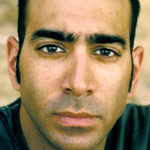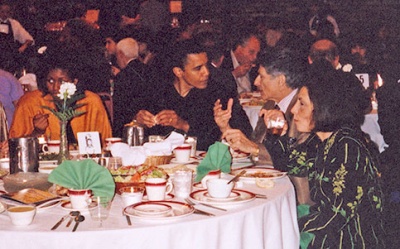Ali Abuminah
Template:TOCnestleft Ali Abuminah is a Chicago activist and the co-founder of The Electronic Intifada and author of One Country: A Bold Proposal to End the Israeli-Palestinian Impasse.
Abunimah travels often to the Middle East and is a full-time researcher in social policy at the University of Chicago.
Early life/education
Ali Abuminah was born in the United States and grew up in Europe. Both of his parents are originally from Palestine. He received his BA from Princeton University and MA from the University of Chicago[1].
Writing/lecturing
Abuminah's articles have appeared in The New York Times, The Los Angeles Times, The Chicago Tribune, The Financial Times, The Philadelphia Inquirer, The Jordan Times, Lebanon's Daily Star and Ha'aretz, among others. He is frequent guest on local, national and international radio and television, including public radio and television, CNN, MSNBC, Fox, the BBC and many others. Abunimah lectures frequently at colleges in the United States.
Recent book contributions include "No Justice, No Peace," in "The Anti-Capitalism Reader," edited by Joel Schalit. New York: Akashic Books, 2002; "The U.S. Media and the New Intifada" (with Hussein Ibish) in "The New Intifada," edited by Roane Carey. New York: Verso Books, 2001; "The Palestinian Right of Return" (with Hussein Ibish), Washington, DC: ADC, 2001; "The Media's Deadly Spin on Iraq" (with Rania Masri) in "Iraq Under Siege" edited by Anthony Arnove. Cambridge, MA: South End Press, 2002 (Updated Edition)[2].
Viva Palestina Malaysia
Viva Palestina Malaysia September 10, 2015 ·
With Anna Baltzer, Samah Sabawi and Ali Abuminah.
Crossroads Fund
In 2005, the board of the leftist, Chicago based Crossroads Fund consisted of[3];
- Ali Abuminah
- Bill Barclay, Co-Chair
- Harry Chandler
- Demetris Giannoulias
- Neena Hemmady, Co-Chair
- Barbara Kemmis, Board Development Chair
- Omar McRoberts (on leave)
- Chirag Mehta, Program Chair
- Lisa Marie Pickens, Strategic Planning Chair
- Barbara Ransby
- Gabe Rodriguez, Development Chair
- Ellen Schumer
- K. Sujata, Treasurer
- Tom Wilson, Secretary
- Martha Wright
- Susana Vasque
Criticizing Obama
In a March 2007 post on his website The Electronic Intifada, Ali Abuminah criticized Barack Obama, for an apparent reversal of his previous pro-Palestinian views[4].
- I first met Democratic presidential hopeful Senator Barack Obama almost ten years ago when, as my representative in the Illinois state senate, he came to speak at the University of Chicago. He impressed me as progressive, intelligent and charismatic. I distinctly remember thinking 'if only a man of this calibre could become president one day.'
- On Friday Obama gave a speech to the American Israel Public Affairs Committee (AIPAC) in Chicago. It had been much anticipated in American Jewish political circles which buzzed about his intensive efforts to woo wealthy pro-Israel campaign donors who up to now have generally leaned towards his main rival Senator Hillary Clinton.
- Reviewing the speech, Ha'aretz Washington correspondent Shmuel Rosner concluded that Obama "sounded as strong as Clinton, as supportive as Bush, as friendly as Giuliani. At least rhetorically, Obama passed any test anyone might have wanted him to pass. So, he is pro-Israel. Period."
- Israel is "our strongest ally in the region and its only established democracy," Obama said, assuring his audience that "we must preserve our total commitment to our unique defense relationship with Israel by fully funding military assistance and continuing work on the Arrow and related missile defense programs." Such advanced multi-billion dollar systems he asserted, would help Israel "deter missile attacks from as far as Tehran and as close as Gaza." As if the starved, besieged and traumatized population of Gaza are about to develop intercontinental ballistic missiles.
- Obama offered not a single word of criticism of Israel, of its relentless settlement and wall construction, of the closures that make life unlivable for millions of Palestinians.
Abunimah then went on to give, a different perspective on Obama's views and told of the Obamas dining with radical Arab academic Edward Said.
.
- Over the years since I first saw Obama speak I met him about half a dozen times, often at Palestinian and Arab-American community events in Chicago including a May 1998 community fundraiser at which Edward Said was the keynote speaker. In 2000, when Obama unsuccessfully ran for Congress I heard him speak at a campaign fundraiser hosted by a University of Chicago professor. On that occasion and others Obama was forthright in his criticism of U.S. policy and his call for an even-handed approach to the Palestinian-Israeli conflict.
- The last time I spoke to Obama was in the winter of 2004 at a gathering in Chicago's Hyde Park neighborhood. He was in the midst of a primary campaign to secure the Democratic nomination for the United States Senate seat he now occupies. But at that time polls showed him trailing.
- As he came in from the cold and took off his coat, I went up to greet him. He responded warmly, and volunteered, "Hey, I'm sorry I haven't said more about Palestine right now, but we are in a tough primary race. I'm hoping when things calm down I can be more up front." He referred to my activism, including columns I was contributing to the The Chicago Tribune critical of Israeli and U.S. policy, "Keep up the good work!"
- If disappointing, given his historically close relations to Palestinian-Americans, Obama's about-face is not surprising. He is merely doing what he thinks is necessary to get elected and he will continue doing it as long as it keeps him in power. Palestinian-Americans are in the same position as civil libertarians who watched with dismay as Obama voted to reauthorize the USA Patriot Act, or immigrant rights advocates who were horrified as he voted in favor of a Republican bill to authorize the construction of a 700-mile fence on the border with Mexico.
- Only if enough people know what Obama and his competitors stand for, and organize to compel them to pay attention to their concerns can there be any hope of altering the disastrous course of U.S. policy in the Middle East. It is at best a very long-term project that cannot substitute for support for the growing campaign of boycott, divestment and sanctions needed to hold Israel accountable for its escalating violence and solidifying apartheid.'


